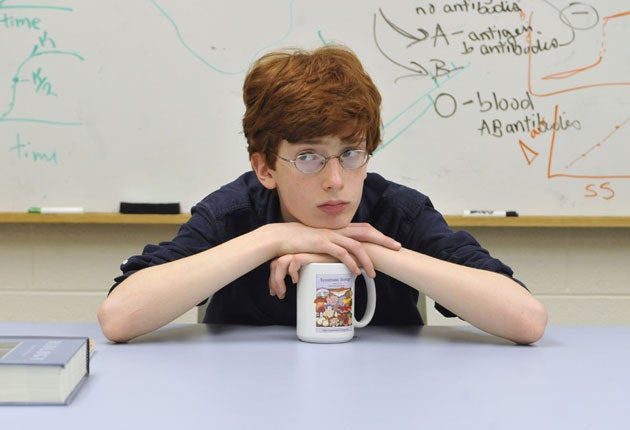Colin Carlson is the kind of student every university loves: bright and engaging, he boasts near-perfect grades and a 100 per cent attendance record during his first year-and-a-half studying for a bachelor's degree in environmental biology at the prestigious University of Connecticut.
He also happens to be just 13 years old. And while that tender age may have been one factor in the decision to award him a highly sought-after academic scholarship, it also lay behind the institution's recent rejection of his request to take part in a summer field trip to the exotic wilds of South Africa.
A professor organising the expedition, to study local plant ecology, apparently said he was unwilling to put the young prodigy into what may turn out to be an unsuitable environment for a small child.
Colin, who has spent his life pushing exactly these sorts of boundaries, decided that his treatment amounted to age discrimination. This being America, he promptly decided to hire a lawyer.
"I'm losing time in my four-year plan for college," he told reporters, after filing a formal complaint. "They're upsetting the framework of one of my majors... It's important to have a very wide world view. Biology is fundamentally about the diversity of life, with a focus across the planet."
The university has not commented in detail on Colin's case, but a spokesman told Associated Press that safety is its principal concern where student travel is involved. It refused to budge on that front when Colin's mother, Jessica, offered to accompany her son to Africa at her own expense.
The affair highlights difficulties faced by US universities that cater for gifted youngsters. While a child genius might prosper academically on campus, and sometimes grow up to be prize-winning star of academia, a high IQ does not always equip them for the social demands of undergraduate life.
Colin was two when he began reading to himself, and by four he was ploughing through the Harry Potter books. He skipped several grades at school, and started taking correspondence courses in subjects like psychology, and history at Connecticut when he was just nine.
After also graduating from Stanford University's online school at 11, he enrolled as a full-time student at his current institution in 2008, when he was 12. Other establishments were eager to take him, but couldn't find a way to get round rules forcing first-year students to live in dormitories on campus.
Connecticut has no such qualms. By his early twenties, Colin aims to have completed a PhD in ecology and evolutionary biology and a degree in environmental law there, so that he can work in conservation, which he describes as his passion.
Colin's mother has proudly allowed reporters to follow her son's progress through America's highly competitive educational system. She says he boasts an IQ of over 160, but has been discriminated against since kindergarten, where teachers would not allow him to read books at nap time and he was targeted by bullies. "You have no idea what kids like this experience," she said.
His time at the University of Connecticut has been largely happy, she added. Female undergraduates think Colin is cute. Their male counterparts therefore want to be friends with him too. When The New York Times spent a day with him on campus last year, an admiring fellow student described him as a "babe magnet."
Colin's lawyer, Michael Agranoff told The Independent that he hopes to resolve the disagreement without resorting to litigation. "The university likes Colin, and rightly so," Mr Agranoff said. "He might one day win a Nobel prize for them. He's 13, but presents himself as if he's 15 or 16, so he's socially mature, and most of all, he's a genius, not a pain in the neck. But there is of course a liability issue with the trip, which I'm guardedly confident about resolving."

Join our commenting forum
Join thought-provoking conversations, follow other Independent readers and see their replies
0Comments